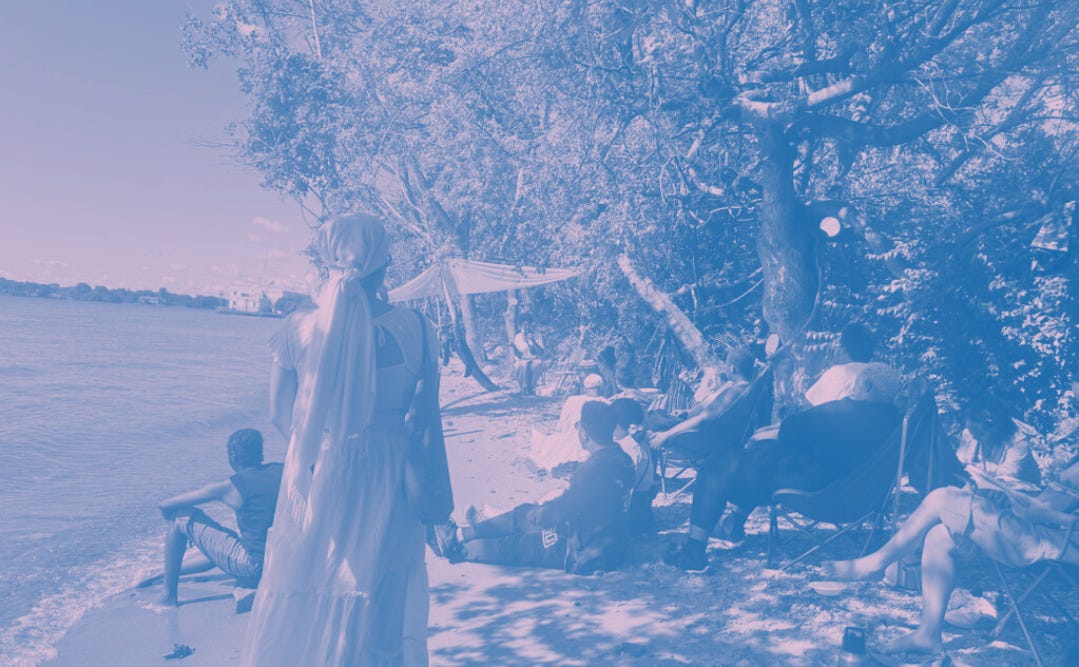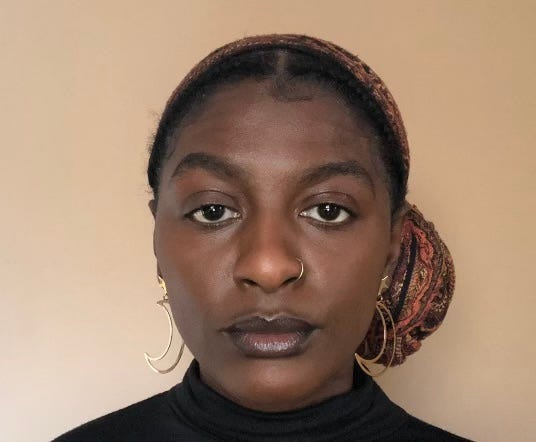Ru: Who are you and how do you show up in the world?
Triniti: I am Trinity. I think a lot about my name, because it means three and three is a number of creation. So I feel like that's been a big element of who I am, that I've been tapping into more.

I've been defining my work and purpose as being a cultural worker and memory worker in Detroit, and what that means to me is tracking the stories, histories and memories of both the people and land of the city to that existence.
Memory is like a core element of that as well. So I utilize memory to both recall who I am, but also who I come from – both the people and spaces. I think when we combine those things together, there exists cultural production.
Triniti: And the other question was, how I show up in the world:
So [cultural worker and memory worker] are two big roles [for me] and I feel like within both of those spaces, I also show up as a student of the world and of the communities around me. I also show up through the different ways I try to record-keep as I relate to different communities move and build with them.
IN ORDER TO MOBILIZE RESOURCES, YOU HAVE TO KNOW HOW TO MOBILIZE RELATIONSHIPS.
Resource mobilizing: defining its role in movement space
Ru: So I know we're here to talk about resource mobilizing, and I'm wondering, what is that and why should people care about it?
Triniti: I think the first thing I always say is, it’s something that has always existed. I think the root and the action of the role is organizing. But to put it in simple terms, resource mobilizing is the utilization of relationships to generate resources towards movements.
The role of the resource mobilizer is to first imagine what resources are needed for movements, and then through interconnected relationships, bringing those resources to the spaces that they're needed.
We can think of resource mobilizers as Fannie Lou Hamer, for example, Ella Baker and many, many more. But I think that's why I take it back to the word organizer, because in order to mobilize resources, you have to know how to mobilize relationships.
Keys to Understanding Resource Mobilizing
Triniti: So I came across the term ‘resource mobilizing’ through Black Youth Project 100 (BYP 100) which is a members-based movement building organization. The Wealth Reclamation Academy of Practitioners (WRAP), also gave me a better understanding of what resource mobilizers do and how much of that work is rooted in healing.
I would also name that a big part of me understanding resource mobilizing was this concept called the Just Transition Framework, which is essentially a framework that spells out the current existence of our economic system – an extractive economy – which is one that's built off of greed, domination, no type of healthy relationship to the natural world.
But the transition within that is trying to lead us towards a solidarity or living economy, where we are in right relationship with the land. We utilize more cooperative economics to mutually exchange resources, rather than separate ourselves from resources, and essentially build the world that we actually live in that's sustainable for all of our needs.
So through the Just Transition Model, the role of the resource mobilizer is to really move us from that place of extraction into one of repair. I feel like when I reflect on the work I want to do for Detroit, that's the action that I want to be a part of. I don't want to just engage with the extractive economy to get crumbs of resources. I actually want to dismantle that system so we can live in a more just, a more mutual world where we see each other for our relationships and the fact that we need each other to exist.
If only it was so simple to snap a finger and we could be there tomorrow. That would be amazing.
How do we get there?
Ru: I'm wondering, how do you think we get there collectively? What are some simple steps that people and spaces in Detroit can take to move toward resource mobilizing, moving in a more intentional way, toward relationship building?
Triniti: Maybe this is my memory worker mind coming out but it’s knowing what exists currently, but also knowing what used to exist. I feel like the extractive economy not only extracts from the natural world or from our lives, but it also extracts from our stories.
Many times, there's all these histories that are intentionally lost, so that when we are in our present moment, we're like, ‘Well, what do we do? How do we do it?’
We're left in this space where we feel like we're only oriented within the now, versus being oriented in generations of resource mobilizers that utilized what they had in order to survive.
Like we come from ancestors that nurtured their own relationship to the land to then receive what they needed to survive. So and we can even kind of see that history exists now with all the urban farms that we have in Detroit.
It's really first addressing, what your why is or understanding what’s essential to your living. Additionally, thinking about the resources or people that can move you toward that space.
A big point of resource mobilization is understanding that it is alternative-making. So if we want it in the extractive economy, we have to think about the alternatives to that: mutual aid and cooperative infrastructures. All of those are currently in Detroit and have existed in the past.
I feel like it’s also making note of or understanding what an extractive economy is. The extractive economy looks like me going to the grocery store and paying almost $5 for one tomato.
I think my point is there are people that have the same questions, but are actually base-building to build the infrastructures so that those alternatives can persist.
So I think a big role within it is just relationship building and knowing how to collect the stories that we need to remind us that another world has always been possible. The only reason we're living in this current world is because other people imagined the unsafe, unaccessible, and unaffordable world that we currently live in. But that doesn't mean that has to be the way our stories end. It really just comes down to thinking about what relationships you really want to be rooted in.
Do you want to be rooted in a relationship to an extractive economy, or, do you want to be rooted in a regenerative economy that actually gives you what you need and reminds you that you are also capable of serving what you need?
Final thoughts
Ru: I'll wrap it with asking you if you have any final words you want to add, whether it's about resource mobilizing or beyond that?
Triniti: Yeah, I think it's important to acknowledge that the Just Transition Framework actually comes from like climate justice route. So the Climate Justice Alliance are the folks that designed the Just Transition Framework. I think is really cool, because I think it also just reminds us that so much of changing our economy is rooted in how we change our relationships to the natural world.
I think it's important to state that within this framework, they’ve built the set of values: a just transition must shift economic control to communities, democratize wealth in the workplace, advance ecological restoration, drive racial justice and show social equity, relocalize most production and consumption and retain and restore cultures and traditions.
So I feel that the last piece is the route to all the things I was trying to articulate. So much of this is remembering traditions of the past and bringing them into the present. Because what capitalism, colonialism, and white supremacy does is dispossess us from those histories that are literally how our ancestors were able to move through all the bullshit that they did. So I think it's just so important to remember that this work starts with restoring your memory of the past.
It also just takes practice. Restoring cultures and traditions in this way can be lifelong work and it is intimate work and gentle work. And at least for me, it's also been healing; but with healing comes grief. But the best way to move through it is doing it with community, like we're all trying to remember our histories, to figure out new ways of being, and when we can remember that and do it together, I feel like it can make the transition feel more possible.
So I just wanted to mention that a lot of this work comes from the climate justice space, and the root of it is just building our relationship back with the earth. We're in a climate catastrophe right now, and so much of that has to do with the fact that we've been living in an extractive economy that doesn't think about healing or repairing what it has taken from the earth.
An extractive economy only thinks about the constant consumption of the earth’s resources. So if we can understand that, we can also understand how the system does that to our souls – I don't want my soul to keep being extracted from and I don't think anyone else does.
So it starts with us coming together within our traditions, within our differences to just to find a way.
I would love if any person who looks at this amazing newsletter has any other questions, I'd love to continue the conversation.
But finally: Go outside. Thank the earth for its existence, because that's how we're able to exist. And just remember your stories. That's the main thing I want people to take away from this.
Wanna chat deeper about resource mobilizing or learn more about Triniti? You can reach her at watsontriniti@gmail.com)








